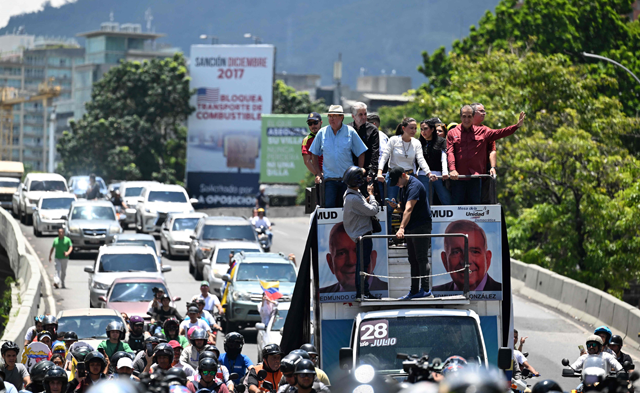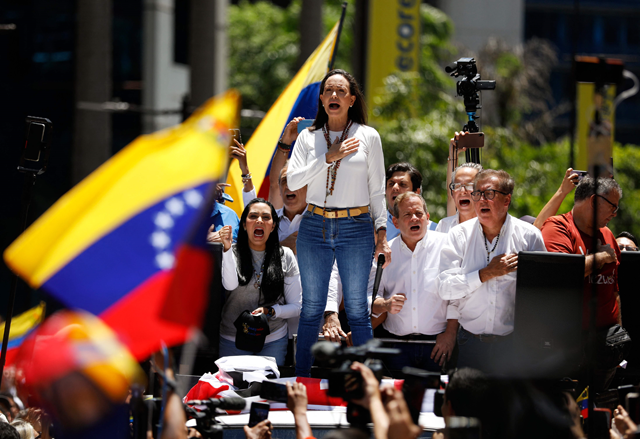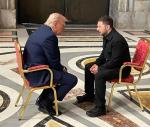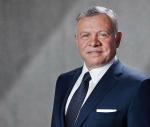You are here
Venezuelan opposition, regime backers to hold rival protests
By AFP - Aug 17,2024 - Last updated at Aug 17,2024

Venezuelan opposition leader Maria Corina Machado (centre), stands atop a truck next to the leader of the opposition Encuentro ciudadano party Delsa Solorzano during a protest called by the opposition for election 'victory' to be recognised, in Caracas on Saturday (AFP photo)
CARACAS — Venezuela's opposition and regime supporters will vie for the streets of Caracas Saturday in competing demonstrations amid a political crisis sparked by a disputed election where both President Nicolas Maduro and his rivals have claimed victory.
"We have to remain firm and united," opposition leader Maria Corina Machado urged supporters in a post on social media platform X on Saturday.
She had called earlier for backers to take to the streets in hundreds of cities in Venezuela and abroad.
"They're trying to scare us, to divide us, to paralyze us, to demoralise us, but they can't because they are absolutely entrenched in their lies [and] violence," she said.
A heavy security presence was taking shape early Saturday. Access to Caracas's vast Petare neighborhood, a few miles from the opposition's announced gathering point, was being controlled by two National Guard armored vehicles backed by about 40 motorcycle-mounted troops.
Local media reported similar deployments in other key areas, where at least 25 people were killed during anti-Maduro protests a day after the July 28 vote that both Maduro and the opposition say they won.
At one of the first overseas demonstrations to get under way Saturday, more than 100 Venezuelans in Australia rallied in Sydney, waving national flags and balloons.
"This is a strong message to our people in Venezuela. We are with you, and we want the world to listen what we are saying," said protest organiser Rina Rivas.
Members of the Venezuelan community also rallied in Melbourne.
Machado, who had her presidential candidacy blocked by institutions loyal to Maduro, will be at the Caracas march despite having been largely in hiding since election day.
Maduro had called for Machado and Edmundo Gonzalez Urrutia, who replaced her on the ballot, to be arrested. He accuses them of seeking to foment a "coup d'etat."
Venezuela's National Electoral Council (CNE) proclaimed Maduro the winner of a third six-year term until 2031, giving him 52 percent of votes cast on July 28 but without providing a detailed breakdown of the results.
The opposition says polling station-level results show Gonzalez Urrutia took more than two-thirds of the vote.
'Lies, repression, violence'
Maduro's victory claim has been rejected by the United States, European Union and several Latin American countries.
Neighbors Colombia and Brazil on Thursday called for fresh elections in Venezuela, but Machado said this would show "a lack of respect" for the popular will already expressed on July 28.
On Friday, Brazil's Luiz Inacio Lula da Silva, traditionally a leftist ally of Maduro, described the regime in Caracas as "very unpleasant" and insisted on the release of a detailed vote breakdown.
In a radio interview, Lula declined to label the Maduro government a dictatorship, but said it had an "authoritarian bias."
The Organisation of American States approved a resolution in Washington on Friday urging Caracas to "expeditiously publish the presidential election records, including the voting results at the level of each polling station."
And in a joint statement on Friday, the European Union and 22 countries called for an "impartial verification" of the election outcome.
Cyber 'attack'
The CNE says it has been unable to release the results due to a "cyber terrorist attack" on its systems, though the Carter Center observer mission has said there was no evidence for such a claim.
The opposition says it has access to 80 per cent of paper ballots cast, which show that Gonzalez Urrutia won easily.
The ruling "Chavista" movement, named after Maduro's socialist predecessor Hugo Chavez, has also called demonstrations for Saturday in Caracas "in support of the victory" of the president in office since 2013.
Maduro has asked the Supreme Court, also said to be loyal to him, to "certify" the election result.
"Venezuela's conflicts... are resolved among Venezuelans, with their institutions, with their law, with their Constitution," he said on Thursday.
Maduro's previous reelection in 2018 was also rejected by many countries, including the United States, and European and Latin American countries.
Related Articles
CARACAS — Venezuela's CNE electoral council, under fire after declaring a widely rejected election victory for President Nicolas Maduro, on
CARACAS — Venezuelan opposition leaders called on Sunday for mass protests on December 1 against President Nicolas Maduro's contested reelec
CARACAS — Venezuela's embattled opposition on Monday vowed to overcome "fear" and thwart President Nicolas Maduro's plans to be sworn


















